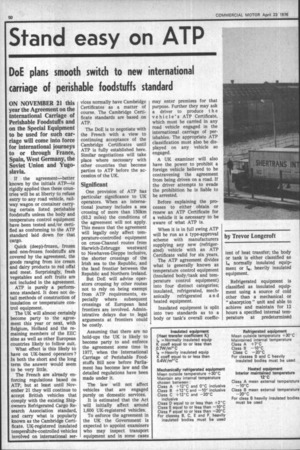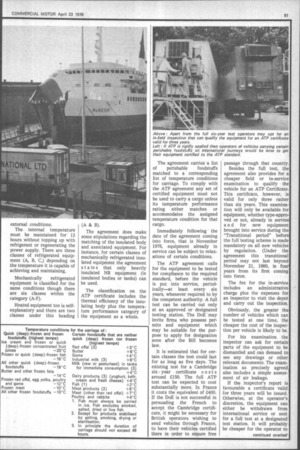Stand easy on ATP
Page 52

Page 53

If you've noticed an error in this article please click here to report it so we can fix it.
DoE plans smooth switch to new international carriage of perishable foodstuffs standard
by Trevor Longcroft ON NOVEMBER 21 this year the Agreement on the International Carriage of Perishable Foodstuffs and on the Special Equipment to be used for such carriage will come into force for international journeys to or through France, Spain, West Germany, the Soviet Union and Yugoslavia.
If the agreement—better known by the initials ATP—is rigidly applied then these countries will be at liberty to refuse entry to any road vehicle, railway wagon or container carrying certain listed perishable foodstuffs unless the body and temperature control equipment have been tested and/or certified as conforming to the ATP standard laid .down for that cargo.
Quick (deep)-frozen, frozen and non-frozen foodstuffs are covered by the agreement, the goods ranging from ice cream and dairy products to red offal and meat. Surprisingly, fresh vegetables and soft fruits are not included in the agreement.
ATP is purely a performance standard. It does not detail methods of construction of insulation or temperature control equipment.
The UK will almost certainly become party to the agreement this year or next, with Belgium, Holland and the remaining members of the EEC nine as well as other European countries likely to follow suit.
What effect is this likely to have on UK-based operators ? In both the short and the long term the answer would seem to be very little.
The French are already enforcing regulations based on ATP, but at least until November 21 they will continue to accept British vehicles that comply with the existing Shipowners Refrigerated Cargo Research Association standard, and carry what is popularly known as the Cambridge Certificate. UK-registered insulated temperSture-controlled vehicles involved on international ser vices normally have Cambridge Certificates as a matter of course. The Cambridge Certificate standards are based on ATP.
The DoE is to negotiate with the French with a view to continuing acceptance of the Cambridge Certificates until ATP is fully established here. Similar negotiations will take place where necessary with other countries that become parties to ATP before the accession of the UK.
Significant
One provision of ATP has particular significance to UK operators. When an international journey includes a sea crossing of more than 150km (93.2 miles) the conditions of the agreement will not apply. This means that the agreement will legally only affect temperature-controlled equipment on cross-Channel routes from Harwich-Zebrugge westward to Newhaven-Dieppe inclusive, the shorter crossings of the Irish sea to the Republic, and the land frontier between the Republic and Northern Ireland.
But DoE will advise operators crossing by other routes not to rely on being exempt from ATP requirements, especially where subsequent crossings of European land frontiers are involved. Administrative delays due to legal arguments at frontiers could be costly.
Assuming that there are no hold-ups the UK is likely to become party to and enforce the agreement some time in 1977, when the International Carriage of Perishable Foodstuffs Bill now before Parliament has become law and the detailed regulations have been made under it.
The law will not affect vehicles that are engaged purely on domestic services.
It is estimated that the Act will initially affect around 1,600 UK-registered vehicles.
To enforce the agreement in the UK the Government is expected to appoint examiners who may inspect transport equipment and in some cases may enter premises for that purpose. Further they may ask a driver to produce t h e vehicle's ATP Certificate, which must be carried in any road vehicle engaged in the international carriage of perishables. The appropriate ATP classification must also be displayed on any vehicle so engaged.
A UK examiner will also have the power to prohibit a foreign vehicle believed to be contravening the agreement from being driven on a road. If the driver attempts to evade the prohibition he is liable to be arrested.
Before explaining the processes to either obtain or renew an ATP Certificate for a vehicle it is necessary to be aware of what ATP is.
When it is in full swing ATP will be run as a type-approval scheme with manufacturers supplying any new (refrigerated) vehicle with an ATP Certificate valid for six years.
The ATP agreement divides what is generally known as temperature control equipment (insulated body/tank and temperature control equipment) into four distinct categories; insulated, refrigerated, mech anically refrigerated a n d heated equipment.
Insulated equipment is split into two standards as to a body or tank's overall coeffic ient of heat transfer; the body or tank is either classified as IN normally insulated equipment or 1, heavily insulated equipment.
Refrigerated equipment is classified as insulated equipment using a source of cold other than a mechanical or " absorption " unit and able to achieve and maintain for 12 hours a specified internal temperature at predetermined external conditions.
The internal temperature must be maintained for 12 hours without topping up with refrigerant or regenerating the power supply. There are three classes of refrigerated equipment (A, B, C,) depending on the temperature it is capable of achieving and maintaining.
Mechanically refrigerated equipment is classified for the same conditions though there are six classes within the category (A-F).
Heated equipment too is selfexplanatory and there are two classes under this heading (A & B).
The agreement does make some stipulations regarding the matching of the insulated body and associated equipment. For instance, for certain classes of mechanically refrigerated insulated equipment the agreement s t a te s that only heavily insulated NR equipment (ie insulated bodies or tanks) can be used.
The classification on the ATP certificate includes the thermal efficiency of the insulating body plus the temperature performance category of the equipment as a whole. The agreement carries a list of perishable foodstuffs matched to a corresponding list of temperature conditions for carriage. To comply with the ATP agreement any set of certified equipment must not be used to carry a cargo unless its temperature performance rating either matches or accommodates the assigned temperature condition for that cargo.
Immediately following the date of the agreement coming into force, that is November 1976, equipment already in service can be subject to relaxations of certain conditions.
The ATP agreement calls for the equipment to be tested for compliance to the required standard, before the vehicle is put into service, periodically—at least every six years, whenever required to by the competent authority. A full test can be carried out only at an approved or designated testing station. The DoE may invite firms who possess permits and equipment which may be suitable for the purpose to apply for designation soon after the Bill becomes law.
It is estimated that for certain classes the test could last for as long as five days. The existing test for a Cambridge six year certificate costs around £150. The full ATP test can be expected to cost substantially more. In France it costs the equivalent of £400. If the DoE is not successful in persuading the French to accept the Cambridge certificate, it might be necessary for British operators wishing to send vehicles through France, to have their vehicles certified there in order to ensure free passage through that country.
Besides the full test, the agreement also provides for a cheaper field or in-service examination to qualify the vehicle for an ATP Certificate. This certificate, however, is valid for only three rather than six years. This examination will only be available for equipment, whether type-approved or not, already in service a n d for new equipment brought into service during the "Transitional period" before the full testing scheme is made mandatory on all new vehicles by regulation. (Under the agreement this transitional period may not last beyond November 21, 1980, ie four years from its first coming into force.
The fee for the in-service includes an administrative charge plus the expenses for an inspector to visit the depot and carry out the inspection.
Obviously, the greater the number of vehicles which can be tested at one time, the cheaper the cost of the inspection per vehicle is likely to be.
For his examination the inspector can ask for certain parts of the equipment to be dismantled and can demand to see any drawings or other relevant documents. The examination as precisely agreed also includes a simple assessment of air leakage.
If the inspector's report is favourable a certificate valid for three years will be issued. Otherwise, at the operator's discretion, the equipment can either be withdrawn from international service or sent for a full test at a designated test station. It will probably be cheaper for the operator to
































































































